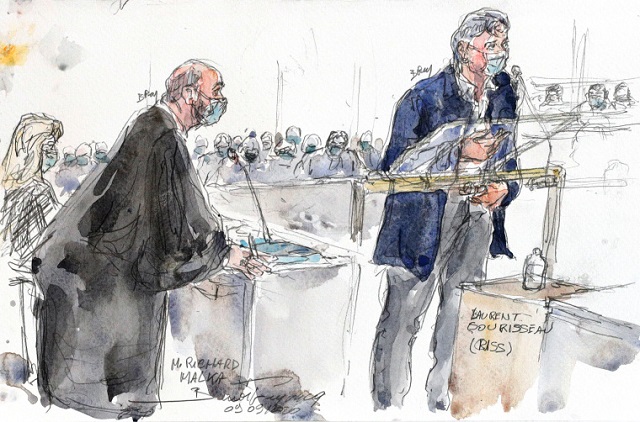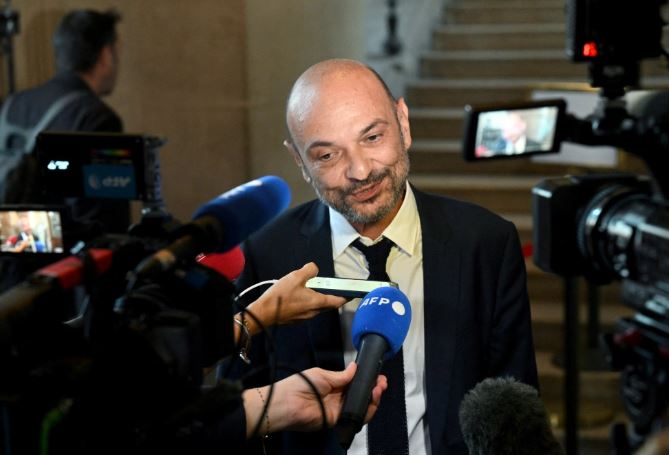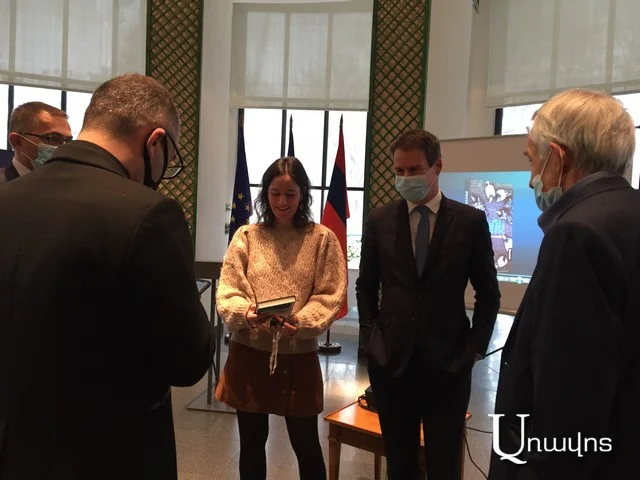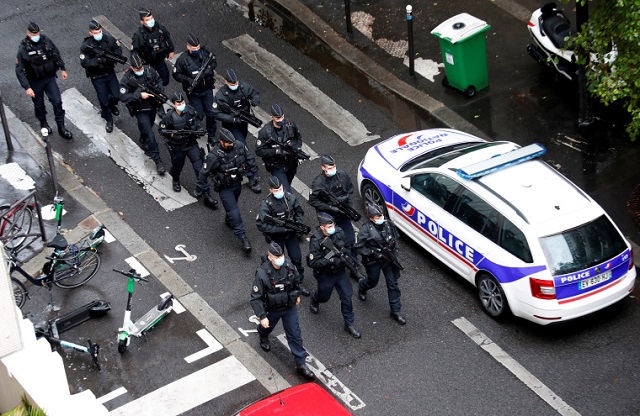The knifings of two employees of a French TV production company outside the former Charlie Hebdo office on Friday, which occurred as a high-profile trial on the 2015 attacks on the newspaper was underway, was a stark reminder that threats to journalists have not disappeared in the five years since the deadly assault.
The megatrial had started on September 2 under heavy police protection. The proceedings — which are scheduled to last until November 10 — cover the massacre of 12 people, including eight journalists, at Charlie Hebdo on January 7, 2015, the shooting of a policewoman in the Paris suburb of Montrouge on January 8, and the killing of four people at the Hyper Cacher store at Porte de Vincennes east of Paris on January 9.
Because of the Covid-19 pandemic, terrorism was not, until Friday’s attack, the first issue of concern among the French public. However, the strength and emotion of the testimonies of survivors and victims’ families had revived fears and traumas. Riss (Laurent Sourisseau), the current executive editor, who was severely wounded during the attack, described how his team of cartoonists, Cabu (Jean Cabut), Charb (Stéphane Charbonnier), Tignous (Bernard Verlhac), Philippe Honoré, Georges Wolinski, and columnists Elsa Cayat and Bernard Maris, were shot in cold blood by the Kouachi brothers (A subeditor, two police officers, a visiting journalist, and a catering employee were also killed).
Read also
“My immediate feeling after the attack was as if my body had been cut in two, as if I had been deprived of a part of me,” Riss testified in a moving homage to his fallen friends and colleagues on September 9. “I miss him so much, it is an open wound that will never heal,” said Denise Charbonnier, the mother of the murdered editor-in-chief Charb, on September 10, before letting the court project on a screen some of her son’s most famous cartoons thrashing religious fanaticism and political extremism. “For a brief moment, smiles and laughs wiped the tears,” Belgium’s Belga news agency reported. Wrapping up their coverage of the first three weeks of the trial, Le Monde reporters Henri Seckel and Pascale Robert-Diard wrote, “We should not shake our notebooks too much, they are full of tears.”
Beyond the suffering of the victim’s families and the motivations of the perpetrators (three assailants were killed during police interventions; the 14 defendants are mostly accused of providing weapons and logistics) the key issue revolved around freedom of expression and religion. On the day the trial opened, Charlie Hebdo republished the Muhammad cartoons which had made the publication a target of militant Islamist groups. The decision reignited a controversy on the reasonableness and the right to publish and triggered a new cascade of threats, in particular by al-Qaeda, against the magazine. “The hatred that struck us is still there and, since 2015, it has had time to mutate, to change its appearance, thus going unnoticed and silently pursuing its pitiless crusade… we will never bow down,” the editor in chief defiantly argued in the magazine as the trial got underway.
Charlie Hebdo is controversial by essence. Although it belongs to an old French tradition, the no-holds barred and acerbic criticism of religions and religious authorities in the name of free mind, atheism, and laïcité, or secularism, its cartoons and columns have often irritated or scandalized, even those who would die for its right to publish. Just after the attacks in 2015 a number of prominent French intellectuals, after duly condemning the killings, had refused to join the “Je suis Charlie” crowds which demonstrated massively in Paris (one million people) and in the provinces. Accusations of Islamophobia, provocation, irresponsibility, were rampant. “Millions of French people rushed to the streets to define the act of spitting on the religion of the weakest as a priority for their society,” sociologist Emmanuel Todd bluntly wrote in his 2015 essay “Qui est Charlie? Sociologie d’une crise religieuse” (“Who is Charlie? Sociology of a religious crisis”).
Five years later these controversies and divisions have not abated. According to a survey by Charlie Hebdo and French polling firm IFOP published in early September, an overwhelming majority of the French population, 88%, condemn the attacks. But the approval of the magazine’s decision to publish the Muhammed cartoons is less universal: 59%. Among 15 to 24-year-olds, 47% even say they “understand the indignation at the cartoons” (the figure for the population as a whole is 29%).
The same survey also reveals a gap between the French public as a whole and the Muslim population: 72% of French Muslims condemn the attacks, but 69% think the publication of the cartoons was a “useless provocation.” Surveys are surveys but another fact also stands out: while in 2007 the satirical weekly had been sued by the Great Mosque of Paris, its new rector as of January 2020, Chems-Eddine Hafiz, made a strong statement in favor of freedom of expression. “Algerian Islam taught me to accept criticism and to respect contrary expression and convictions,” he wrote in Le Figaro on September 4. “Charlie Hebdo should continue to write, to sketch, to use its art and above all to live. All Muslims should understand the cultural traditions of satire and of the democratic space which allows all expressions, even those which appear excessive.”
In an interview published in the August 13 issue of the center-right magazine Le Point, titled “Have the Islamists won?” Charlie Hebdo’s lawyer Richard Malka, however, argued that “the situation [of freedom of expression] is much worse than five years ago.” The threats are real. After the republication of the cartoons Al-Qaeda again threatened Charlie Hebdo, the staff of which has been under police protection for years since before the attack and now works from a secret place. On September 21, the magazine’s human resources director had to be rushed to a safe place by the police after death threats against her were considered imminent.
Is the French press really less free because of these attacks? Outside of Charlie Hebdo some cartoonists and journalists confess in interviews that they are more wary when they refer to religions and in particular to Islam But Malka’s point is broader than physical safety. In fact he indicts what he describes as a growing fear, especially among leftwing intellectuals, of criticizing Islam under the pretext that it is a religion of an oppressed minority. “I am angry at these radical leftists who stabbed us by becoming religious bigots,” he told Le Point. In France, perhaps even more than in neighboring European countries, Islam is the main issue of the culture wars, the struggle to define the soul of the nation, and a major point of contention in political controversies.
The prominence of a number of Islam bashers on popular TV talk shows and the success of magazines openly hostile to Islamism and even Islam downplay Malka’s claim. Other journalists would also question the idea that they restrict their freedom when addressing Islam-related issues.
Beyond these polemics French journalists deemed it wise to clarify the points on which they all agreed. On September 23, more than a hundred French news media outlets endorsed an open letter to defend freedom of expression. This appeal, at Charlie Hebdo’s initiative, rallied newsrooms of very different ideologies and convictions, from the liberal weekly L’Obs to the Catholic daily La Croix, from the Communist L’Humanité to the conservative Le Figaro. “Some of the signers are believers and may naturally be shocked by blasphemy (note: in France blasphemy is legal) and, however, they join our call without reservation,” the statement said, “because while defending the freedom to blaspheme, we don’t defend blasphemy but freedom.”
Editor’s note: The quote from Charlie Hebdo lawyer Richard Malka has been corrected in the ninth paragraph.
Committee to Protect Journalists


























































